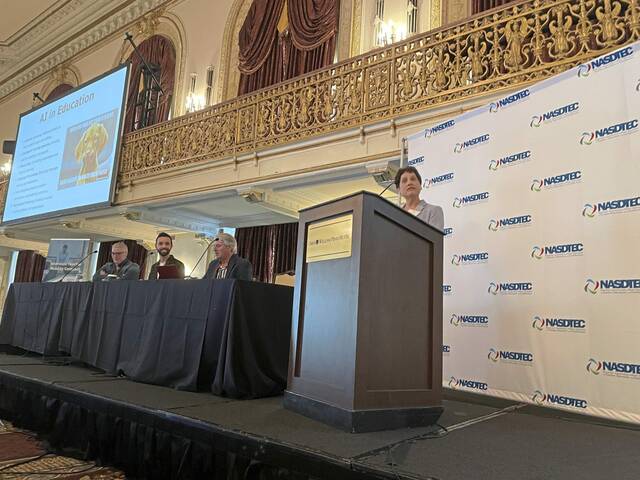https://naviga.triblive.com/local/regional/avoiding-ai-not-an-option-for-teachers-education-experts-say-at-pittsburgh-conference/
Avoiding AI not an option for teachers, education experts say at Pittsburgh conference

As discussions of artificial intelligence technology make their way into classrooms across the country, education experts speaking at a national conference in Pittsburgh Tuesday urged teachers to take part in the conversation.
Mike Searson summarized it simply: educators cannot handle AI the same way they addressed the rise of social media.
“We really screwed up when it came to social media. The general way we handled that as educators was we backed away from that,” Searson told a room of educators listening in on an AI panel discussion. “We did nothing to teach learners how to properly use these tools, so what’s happening right now is social media is a complete mess.”
More than 200 state government officials, representatives from educator preparation programs and school district administrative staff attended the conference, which included a presentation by U.S. Department of Education Deputy Secretary Cindy Marten.
Joseph Pearson, head of partnerships for Moreland University, felt firsthand the social media impact Searson described.
“It created for my generation a serious problem of socialization, anxiety and loneliness,” said Pearson, addressing his experience growing up during the rise of social media. “I wonder what potential challenges we will face for the future generation of students who grow up with AI.”
Searson — a board member of the Association for the Advancement of Computing in Education — encouraged educators to implement AI strategies similar to Utah, whose state board of education developed policies to guide school districts’ use of the technology.
“In Utah, when AI came online and ChatGPT was released and all these things, we immediately jumped in to figure out how it was going to impact our state and impact our students and impact our teachers,” said Malia Hite, executive coordinator of educator licensing for the Utah State Board of Education.
Utah’s AI framework applies to classroom instruction and school management, Hite said, but it also created a required AI training for board of education employees.
Although AI has become a hot topic of discussion in education in recent months, it is not new to teachers, Pearson said.
“While in this room, we may be thinking about AI for the first time or engaging with it in a relatively new way,” he said, “I’m going to guarantee you that teachers in your state have been using it for months if not over a year now.”
Pearson — who is completing a doctoral dissertation at UCLA on student ownership in the learning process — has seen educators use AI to generate lesson plans, individualize lessons for a specific students’ needs and complete routine tasks such as writing emails.
Common classroom games, such as trivia-style study tool Kahoot, also incorporate AI, he said.
AI is not a perfect tool, he said. The technology may present results including biases or inaccurate information.
Teachers will have more success using AI tools like ChatGPT if they supply it with more information, Pearson said. To generate an effective lesson plan, for example, Pearson recommended supplying ChatGPT with studies, images or other sourced information.
Pearson added that AI policies for schools cannot be developed solely by education leaders.
“We need to tap into the voice — empower the voice — of the teacher, the student, the school-based technologist,” he said.
Regardless of how AI evolves, providing a high-quality education should be the priority, Hite said.
“If we can do that and maintain that goal as our focus, then all of the other noise, we’ll be able to say ‘We’re going to use that tool as a lever to better reach our goal’” she said, “instead of having it be a barrier that we’re going to kick out of our school.”
Copyright ©2026— Trib Total Media, LLC (TribLIVE.com)
